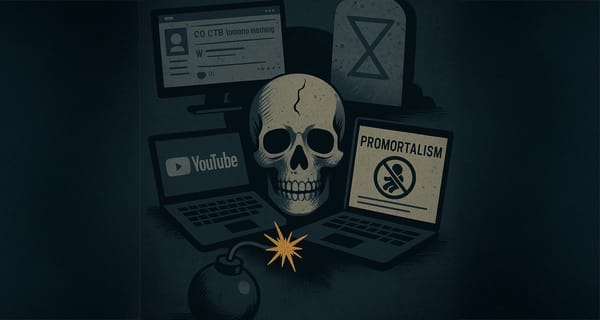Pedophilia Normalization And The Battle For Legislative Frameworks
The trope of living in a world where it is forbidden to forbid is coupled with the fever dream of a digital age which does not forbid, and even equalizes access to digital offending.

A set of campaigns by the fashion house Balenciaga ignited public controversy over the sexualization of children. The campaign images show children barely out of toddlerhood holding stuffed animals in BDSM-inspired outfits, the scene is set against a bedroom backdrop; empty drink glasses and accessories lay scattered around like a hotel afterparty. Among the props in another photoshoot are court documents referencing Ashcroft vs. Free Speech Coalition, the Supreme Court opinion responsible for striking down portions of a federal act banning what is referenced in legal documents as "virtual child pornography", but, what is more accurately referred to as child exploitation material.
The court documents are probably the most striking clue in the subtle art of significance and suggestive tone. As with most creative, tone depends on the audience, and the author's intentions on what it hopes to convey, in this case, the creative draws attention to the erotic variety. Toddlers engaging in playful acts undercut the campaign's menacing tone, shielding it from the stigma of resembling something forbidden.
Prior to the technical developments of the digital age, soft power was traditionally exported through culture and arts which served as the perfect vector for shaping thoughts and ideas. The defining feature of soft power is that it is non-coercive, and captivates with appeal but this can only go so far. The next phase of soft power is in the deconstruction of norms and laws. The Balenciaga campaigns remind us that the battle is now in legislative frameworks, and in the deregulatory drive that leads to the breakdown of normative structures like consent.
Predictions over the years have theorized that the peak logical end of sexual liberalism is pedophilia normalization. It is forbidden to forbid, a phrase associated with the 1968 civil uprising in Paris, France, where Balenciaga is headquartered, became an expression of anti-establishment sentiment. The movement pushed boundaries on anything that opposed limits on individual liberty, as long as social norms existed freedom was only ephemeral to the movement.
From this era emerged a decade of queer radicalism and Derridean deconstructionism:
"This hedonic and individualistic explosion contrasts with the politicization of the movement, its Leninist-inspired speeches, and its parades to the sound of the International" a soviet anthem that became the song of socialist and communist parties.
Pierre Viansson-Ponté, the editor-in-chief of Le Monde, concluded that France was bored.

Figure 1: May 1968
In 1977, French academics, Derrida, Sartre, de Beauvoir, and Foucault, petitioned for the reversal of articles that established age of consent laws, the argument drawing heavily on discrimination against gay men, which deconstructionists argued, was coded in age of consent laws. The petition cited the "Affaire de Versailles", a criminal case where three adult men in their forties were accused of having sex with 13 and 14-year olds of both genders while out at a naturalist camp. The case was reported by members from the, The Revolutionary Communist League, who characterized charges against the men as an assault on nature. French newspapers Libération and Le Monde defended the idea of sex with minors. Despite the petition, the Court of Assizes handed down a guilty verdict with a 5-year prison sentence, after taking into account the testimony of a teenager, which showed that the concept of consent was not obvious to the child.

Figure 2: Derrida, Sarte & de Beauvoir, Foucault
The Free Speech Coalition was founded as a California trade association for the adult entertainment industry. In 2001, FSC filed a lawsuit against Attorney General John Ashcroft charging that the Child Pornography Protection Act, which sought to criminalize the depiction of minors in sexually explicit content, abridged first amendment rights. In 2002, the Supreme Court struck down CPPA in Ashcroft v. Free Speech Coalition for being too broad, concluding that it would prohibit speech with literary or artistic value. Their opinions weighed heavily on whether the average person in the community would find the predominant theme of works like Romeo and Juliet lewd and indecent.
The deregulatory drive for laws like age of consent and child exploitation material is sought in part for fear legislation endangers the activities of sex workers, pornographers, and pedophiles. In 2018, Free Speech Coalition’s Executive Director, Ian O’Brien helped launch the Prostasia Foundation, which is registered in the state of California as a 501(c)(3) nonprofit public benefit charity. Prostasia consists of a team of kink enthusiasts, sex workers, and in its earlier years, multiple convicted sex offenders. Charities in the State of California are regulated through the Attorney General who requires annual filings to ensure charitable assets are going towards intended use, but gaps in oversight and unlawful practices within these organizations reveals the way these laws can be exploited to tap into federal resources.
Prostasia Foundation was founded in response to FOSTA/SESTA, legislation aimed at protecting children from online sex trafficking, except they viewed the legislation as a threat to pornographic interests, and lobbied against it on the grounds that it violated free speech. They advocate for illicit practices, like how to avoid law enforcement sting operations in the solicitation of minors in chat rooms like Roblox, a popular children's gaming platform. They claim child abuse prevention should involve teaching children about fetishes and kink, and that viewing pornography can have a positive impact on children.
These ideas derive from the influence of intellectuals who see pedophilia as a multidimensional scale of sexual interest. Before becoming an advisor for Prostasia, James Cantor worked as a senior scientist with the Centre for Addiction and Mental Health (CAMH), Canada's largest mental health teaching hospital. Cantor advocates that pedophilia is a sexual orientation that belongs within the LGBT movement. An NIH paper written by Cantor and clinical psychologist, Ray Blanchard, alleges that pedophiles are born, not made. Blanchard wrote the criteria for paraphilia in the Diagnostic and Statistical Manual of Mental Disorders (DSM-5) and tried to change its classification. The change resulted in this statement by the APA maintaining its position that "pedophilia is a mental disorder; that sex between adults and children is always wrong; and that acting on pedophilic impulses is and should be a criminal act."
Forensic psychologist, Michael Seto, a former colleague of Cantor’s at CAMH, claims that pedophilia in males can be parsed down to an identity label, in the same way homosexuality has been parsed down to identity labels like "queer" and "gay". Seto argues that viewing pedophilia as a sexual orientation will prevent child abuse and that removing the stigma of pedophilia will encourage those who want to offend to seek treatment for self regulation. Except self-regulation methods for pro-pedophilia advocates relies heavily on peer-to-peer support groups, as they are typically not interested in traditional treatment methodologies; why should they be, if they or society views pedophilia as a sexual orientation then there is no mental illness to overcome. Seto's impact on this space cannot be minimized, even after his paper on pedophilia as a sexual orientation was published he wrote a chapter on internet-facilitated sexual offending for the SMART program in the Department of Justice.
Sexual fantasies relating to children typically occur in the context of secrecy, but social media has changed this, enabling pro-pedophilia social clubs that sell themselves as global intervention initiatives; safe spaces for pedophiles to "self-regulate" in times of trouble. Prostasia advocates for a group called, MAP Support Club, a peer-to-peer social club for "minor attracted persons," or pedophiles, who self-police in their commitment to never harm a child. Within these communities pedophiles and offenders build camaraderie in chat rooms that include children as young as 13 years-of-age. Between these virtual walls, there is no policing between the minds of pedophiles. According to Glen Pounder, VP of Child Rescue Coalition and intelligence veteran with the National Crime Agency, "The use of the term "MAP" risks a path to normalization of sexual attraction to children as a sexual orientation. This is dangerous as it puts an even greater sense of righteousness into the minds of those who already believe sexually abusing (and raping) children is normal. Some offenders even seek to convince themselves that children enjoy the abuse." A few years ago, it turned out one of those in the pedophile support club was busy actively raping kids.
In 2019, Prostasia founder Jeremy Malcolm was a member of the multi-stakeholder advisory group of the United Nations Internet Governance Forum. A critical policy event took place that year, the drafting of guidelines regarding the implementation of the Optional Protocol to the Convention on the Rights of the Child on the sale of children, child prostitution and child pornography. Prostasia petitioned a substitution argument against U.N. guidelines that would effectively call to criminalize obscene images depicting children.
An objective in the movement to destigmatize pedophilia, attempts to refine obscene practices until they become so mundane that we all just begin to accept them. The trope of living in a world where it is forbidden to forbid is coupled with the fever dream of a digital age which does not forbid, and even equalizes access to digital offending. “Backed by evidence from studies on dark web offenders, is the vast majority of these criminals have no intention on rehabilitation or of not harming children,” says Glen Pounder, “they revel in abusing children and the support networks that they’ve established since the rise of the Internet only help with their beliefs, “ Pounder continues, “the 29 million cyber tips that have been sent in, isn’t anywhere near the true scale of the problem.”
The pro-pedophilia advocates of 1968 saw sexual liberation as something rooted in an oppressive system that affects marginalized groups, these ideas have not left the public sphere, they have only been passed down in modern sexual liberation movements and are returning in full force. For pedophilia as a sexual orientation to come to fruition, they must garner public consent, which is critical in the quest to battle legislative frameworks.




